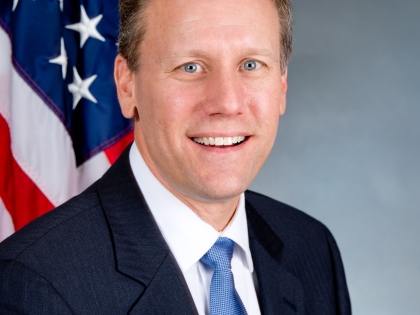
Senator Valesky Proposes Long-Term Bi-Partisan Operating Agreement to Get Senate Back to Work
David J. Valesky
July 7, 2009
ALBANY, N.Y.-- In an effort to break the Senate stalemate, Senators David Valesky (D-Oneida), Jeff Klein (D-Bronx/Westchester), Darrel Aubertine (D- Jefferson/Oswego/ St. Lawrence), William Stachowski (D- Erie), Craig Johnson (D- Nassau), Diane Savino (D- Brooklyn/Staten Island), Brian Foley (D- Suffolk), Thomas Duane (D-Manhattan) and George Onorato (D-Queens) proposed a long-term bipartisan operating agreement that would get the Senate back to work. The agreement was presented to Republican leaders and Senators Dean Skelos and Pedro Espada, Jr. at a meeting with Governor Paterson Tuesday afternoon.
“This proposal, built on a bipartisan governance and committee structure, is a fair and reasonable solution that will allow us to work together. It is my hope that we will be able to put the challenges we have faced over the last five weeks behind us and create a truly bipartisan Senate,” Senator Valesky said. “I encourage all of my colleagues who believe that it is time to end this stalemate to put aside partisanship once and for all, and join us in creating a Senate that will serve the people of New York, not the politicians.”
“I urge the Senate Republicans to accept this agreement immediately. Simply put, it is fair and makes sense and would get us all back to work immediately,” said Senator Klein.
"What we are proposing today is a long-term comprehensive framework that will allow us to move forward in a bipartisan manner. It is my hope that this will end the stalemate and bring all of us together,” added Senator Johnson.
“This represents an answer not only to the current crisis but a real bi-partisan solution to insulate the institution and the State of New York from this happening again,” said Senator Savino.
“It is time to end this once and for all. I believe that this agreement is the only fair, equitable and bipartisan solution to this crisis. I look forward to resuming work on legislation that is crucial for my constituents and all New Yorkers,” said Senator Duane.
The details of the proposed agreement are as follows:
*The powers traditionally exercised by the President Pro Tempore of the Senate will be shared jointly by a 2 Conference Presidents who shall also serve as Co-Presidents Pro Tempore. These Co-Presidents Pro Tempore will alternate daily during scheduled session days and weekly during periods when the Senate is not in regular session.
*Neither Co-President Pro Tempore may cast a “casting vote” on any procedural or legislative matter before the Senate.
*Each Conference shall also designate a Co-Majority Leader.
* The 2 Conference Presidents shall act jointly to make any appointments of Senate officers, non-partisan employees, and appointments or nominations to state boards and commissions.
*There shall, however, be 2 Co-Secretaries of the Senate appointed by each Conference President with each having veto power over the decisions of the other to jointly execute the powers of that office.
*During days when the legislature is in Regular Session or Extraordinary Session, the acting President Pro Tempore shall designate a Presiding Officer and the opposing Conference President shall designate a Floor Leader.
*Should an Extraordinary Session be called by the Governor, the Conference President acting as President Pro Tempore on the designated day shall designate a Presiding Officer for the first day of that Extraordinary Session. If the Extraordinary Session lasts for more than a single day, the Presiding Officer shall alternate daily until the conclusion of that Extraordinary Session. The opposing conference shall designate a Floor Leader, which shall also alternate daily.
*In the event that the Governor is out-of-state or temporarily unable to perform his duties, the acting Co-President Pro Tempore for that day shall temporarily assume his duties. In the event of a permanent vacancy in the position of Governor, the acting Co-President Pro Tempore on the day that the vacancy is created shall accede to the position.
*There shall be equal representation of each conference on all Senate Committees, with all committees having a Co-Chair designated by each Conference President. Co-Chairs shall jointly convene meetings and determine the committee agenda. The Co-Chairs shall alternate presiding over committee meetings, unless they agree to an alternate arrangement. Each Co-Chair shall be able to place up to 3 bills on each committee agenda without the consent of the other.
*3/5 votes of each committee shall be required to report a bill out of committee.
*If a committee declines to act upon a particular bill, the introducer of that bill shall be able to discharge the bill from committee with a 3/5 vote of the entire chamber, and such bill shall be placed on the active list.
*Committee Co-Chairs shall jointly convene Public Hearings, issue Committee Reports and conduct Committee Investigations. However, each Co-Chair may conduct up to 2 Public Hearings per year and up to 3 Presentations of Bills per year without the consent of his or her fellow Co-Chair.
* The calendar and active list shall be prepared by a committee of six Senators. The 2 Conference Presidents shall each appoint 3 members to that committee. At least 4 committee members must vote to place a bill on the active list. The committee shall also be responsible for designating dual references of bills to the Senate Committees on Codes and Finance subject to guidelines approved jointly by the 2 Conference Presidents. In the event of a tie vote, only a single joint vote of the 2 Conference Presidents may break the tie.
*Each Conference President is responsible to referring that Conference’s bill to the appropriate committee.
*Conference Committees and Joint Budget Hearings shall only be conducted with equal participation by both Conference.
*A Nonpartisan Fiscal Office shall be established to serve each member equally and confidentially. Each conference shall also have its own Finance Committee Oversight Office to serve its own members.
*In the event of a conflict between the Rules of the Senate and this agreement, this agreement shall prevail.
*This agreement shall remain in effect until December 31, 2010, unless a special election to fill a vacancy allows either conference to obtain a majority of 32 votes.
##

